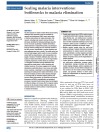
The slow progress in malaria control efforts and increasing challenges have prompted a need to accelerate the research and development (R&D), launch and scaling of effective interventions for malaria elimination. this research, including desk research and key informant interviews, identified the following challenges along the end-to-end scale-up pathway of malaria interventions.
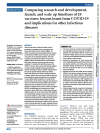
Over the next decade, millions of deaths could be prevented by increasing access to vaccines in low-income and middle-income countries (LMICs). The COVID-19 pandemic has demonstrated that the research and development (R&D), Launch and scale up timelines of vaccines can be drastically shortened.
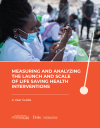
This user guide is intended to support better measurement and understanding of the pathways and key factors involved in the launch and scale of health interventions in LMICs.
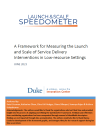
Low-and middle-income countries are increasingly faced with competing health challenges that may be addressed through health care interventions implemented by organizations operating outside of the public sector. Insufficient public sector care delivery infrastructure and limited workforce, combined with slow scaling of service delivery interventions implemented by social enterprises, NGOs, and the private sector, leads to global delivery gap in these settings.
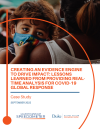
In response to the COVID-19 pandemic, unprecedented public and private investments and collaborations accelerated the research, development, manufacturing, and distribution of new interventions, especially safe and effective vaccines.
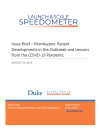
In this brief, we highlight the challenges in controlling the monkeypox outbreak in global and US contexts and provide practical recommendations and lessons from the COVID-19 pandemic. This issue brief will focus primarily on analysis of the monkeypox vaccine marketplace as an urgent and pressing challenge.
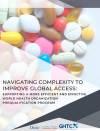
This report examines successes and pain points of the World Health Organization’s (WHO) Prequalification (PQ) Program and offers actionable recommendations to strengthen its role in facilitating global access to medical products.
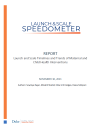
A report describing the application of the Speedometer framework to analyze select interventions that address maternal, newborn, and child health. In addition to analyzing and reporting on launch and scale trends and patterns for these interventions, this report provides recommendations for the community of funders and policymakers to enable proven interventions to reach more people rapidly.
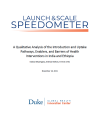
New and enduring global health challenges need effective, proven solutions and interventions that can be scaled to reach the most vulnerable populations.
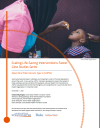
This case study is part of a series that explores pathways and important factors that contribute to the development and uptake of global health interventions - from proof of concept to scale-up.
